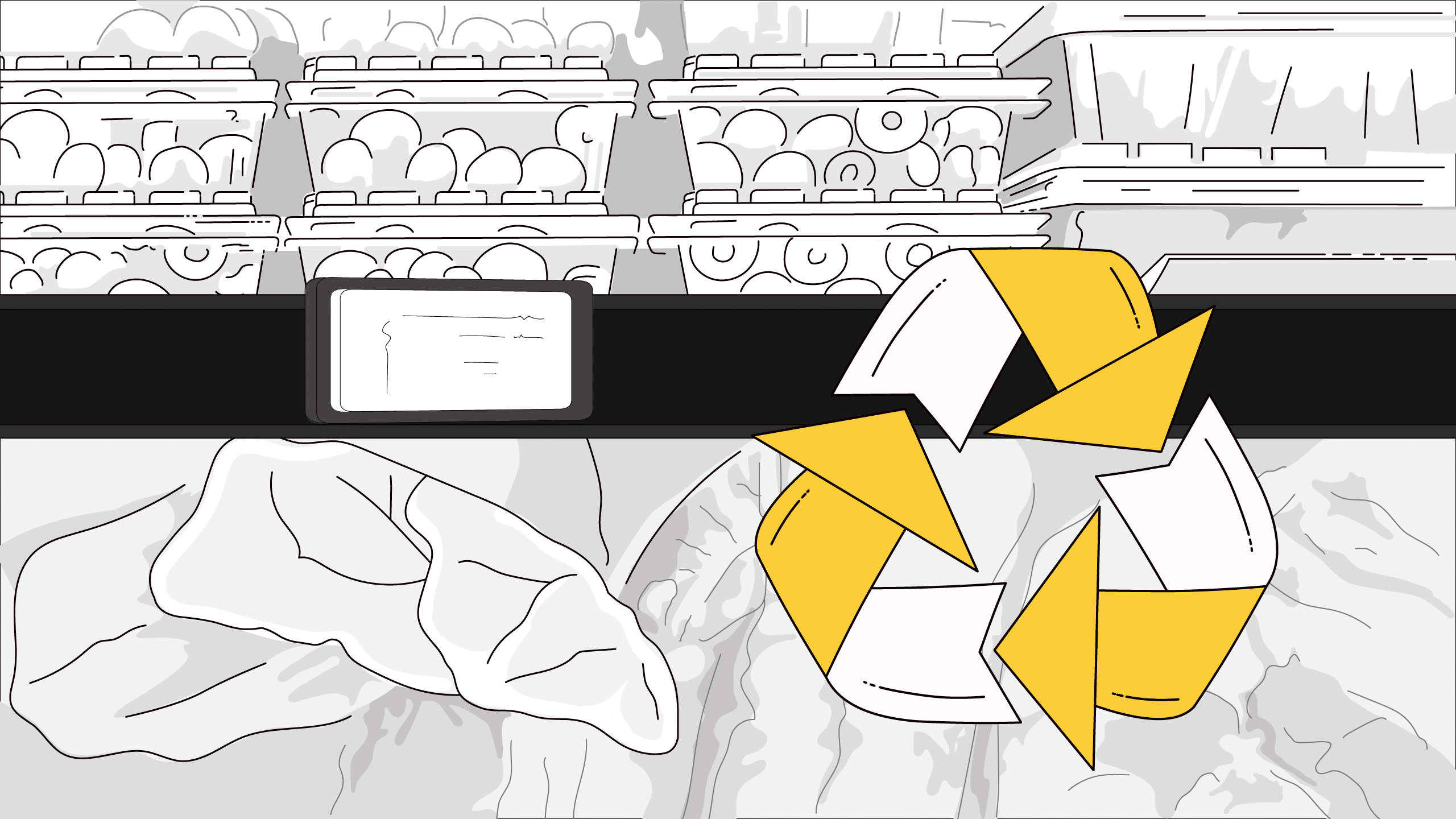Sustainable Retail: 5 Must-Know Tips for Reducing Waste and Costs
In the evolving landscape of retail, sustainability has shifted from a niche interest to a central strategy for leading businesses. As environmental concerns become increasingly urgent, retailers are not just expected to provide products and services, but also to lead in environmental stewardship. This article outlines five essential tips for retail managers and businesses aiming to enhance their sustainability efforts.
Embrace Sustainable Retail Solutions with VusionGroup’s Technology
Embracing sustainable solutions is essential for modern retailers aiming to reduce their environmental impact. VusionGroup’s advanced technology provides innovative ways to minimize waste and enhance operational efficiency.
Enhance Customer Interaction with Digital Displays
Digital displays are another sustainable innovation from VUSION. These displays replace paper signs and posters, providing dynamic and engaging content that can be updated remotely. This reduces the need for printed materials, and enhances the shopping experience by providing relevant and timely information.
Real-Time Updates for Efficient Operations
VusionGroup’s solutions extend beyond sustainability to operational efficiency. The ability to update pricing and product details in real-time minimizes errors and reduces the labor associated with changing paper tags. This efficiency translates to lower operational costs.
By leveraging VusionGroup’s technology, retailers can significantly reduce their environmental footprint while enhancing the shopping experience and operational efficiency. This shift not only meets consumer demand for eco-friendly practices but also positions retailers as leaders in sustainability.
Streamline Recycling Efforts Using IoT Technology
The integration of Internet of Things (IoT) technology into recycling processes marks a significant advancement for sustainable retail operations. By automating the identification and sorting of recyclable materials, IoT technology not only enhances efficiency but also accuracy, enabling retailers to manage waste more effectively.
Leveraging Electronic Labels for Efficient Recycling Sorting
Electronic labels can transform the recycling capabilities of a retail environment. These labels, embedded with smart technology, can store detailed information about the product and packaging materials, allowing automated systems to easily identify and sort them according to their recyclable traits. This precise sorting ensures that materials such as plastics, metals, and paper are correctly recycled, reducing contamination rates and improving the quality of recycled materials.
Implementing Smart Bins in Retail Environments
Smart bins equipped with sensors can significantly optimize the waste management process. These bins can detect the type of waste deposited and measure fill levels, alerting facility managers when they are full and need to be emptied. This not only helps in maintaining a cleaner retail environment but also in routing waste directly into appropriate recycling workflows, further minimizing the amount of waste sent to landfills.
Impact of VusionGroup’s IoT Solutions on Recycling Rates
VusionGroup’s IoT solutions provide a comprehensive system that tracks and analyzes waste management practices in real-time. By leveraging data collected from IoT devices like electronic labels and smart bins, retailers can gain insights into their waste patterns and identify areas for improvement. Implementing these technologies has shown to increase recycling rates significantly, as data-driven decisions lead to more targeted and effective recycling strategies.
Optimize Supply Chain Efficiency with Real-time Tracking
Optimizing the supply chain is crucial for sustainable retail, reducing both waste and costs by ensuring that products are managed efficiently from source to store.
Utilizing Electronic Labels for Inventory Management
Electronic labels play a pivotal role in streamlining inventory management. By providing real-time data on product locations and stock levels, these labels help retailers reduce overstocking and understocking situations, which can lead to product waste. The ability to track products throughout the supply chain also allows for better forecasting and demand planning, ensuring that products are supplied according to consumer needs without excess production.
Reducing Carbon Footprint with Efficient Logistics Planning
Efficient logistics are essential for minimizing the carbon footprint of retail operations. By implementing real-time tracking systems, retailers can optimize delivery routes and schedules, reducing unnecessary fuel consumption and emissions. Additionally, better logistics planning can lead to fewer return trips and less congested traffic, contributing further to carbon reduction efforts.
Success Stories: How VusionGroup’s Technology Transformed Supply Chains
Several leading retailers have successfully integrated VusionGroup’s technology to enhance their supply chain operations. These success stories highlight how real-time data and analytics can lead to more efficient supply chain management, with measurable improvements in speed, cost, and environmental impact.
By continuing to leverage advanced technologies and innovative practices, retailers can not only improve their operational efficiency but also significantly contribute to environmental sustainability, paving the way for a greener future in the retail industry.
Enhance Energy Management with Smart Sustainable Retail Solutions
Effective energy management is crucial for reducing the environmental impact of retail operations. Smart retail solutions, including IoT devices, offer significant opportunities to not only monitor but also actively reduce energy consumption in stores.
IoT Devices for Monitoring and Reducing Energy Consumption
IoT technology enables real-time monitoring of energy usage across retail environments, from individual stores to entire chains. Sensors and smart meters can track everything from lighting to HVAC systems, identifying patterns and areas where energy waste is occurring. Retailers can use this data to make informed decisions about energy use, such as adjusting lighting schedules based on store hours or optimizing temperature settings for different times of the day.
Integrating Renewable Energy Sources with Smart Controls
The integration of renewable energy sources, such as solar panels, with smart control systems can significantly enhance energy efficiency. These systems allow for the automated management of energy flows, ensuring that renewable sources are maximized and supplementing with grid energy when necessary. This not only reduces reliance on non-renewable resources but also lowers energy costs in the long term.
VusionGroup’s Role in Creating Energy-Efficient Retail Spaces
VusionGroup’s smart retail solutions play a pivotal role in transforming retail spaces into energy-efficient establishments. By providing advanced analytics and control systems, Vusion helps retailers effectively manage their energy consumption, leading to substantial reductions in both carbon footprint and operating costs.
Foster a Culture of Sustainability Through Employee Engagement
Cultivating a culture of sustainability within retail operations is essential for long-term success. Engaging employees in sustainable practices not only promotes a positive work environment but also enhances overall business sustainability.
Educating Staff with Interactive Electronic Displays
Interactive electronic displays are an effective tool for educating staff about sustainability practices. These displays can provide real-time information and feedback on energy usage, recycling rates, and other sustainability metrics. By making this information readily accessible, employees become more aware of their impact and are encouraged to participate actively in sustainability efforts.
Encouraging Sustainable Practices with Gamification and Incentives
Gamification techniques can be employed to further engage staff in sustainability initiatives. Setting up challenges and competitions related to energy savings or waste reduction, and rewarding successful teams or individuals, can motivate employees to adopt and maintain sustainable behaviors. Incentives such as bonuses, extra vacation days, or public recognition can enhance participation and commitment to these initiatives.
Celebrating Success: Highlighting Employee Contributions with Digital Recognition
Recognizing and celebrating the contributions of employees to sustainability goals is vital for maintaining engagement and enthusiasm. Digital platforms can be used to highlight individual and team achievements, sharing success stories across the organization to inspire continued effort and dedication to sustainability practices.
By reducing waste and costs through eco-friendly packaging, smart recycling initiatives, optimized supply chain operations, intelligent energy management, and engaging employee practices, retailers can build a more sustainable future while improving their bottom line. These strategies not only address pressing environmental issues but also cater to the growing consumer demand for responsible business practices.


